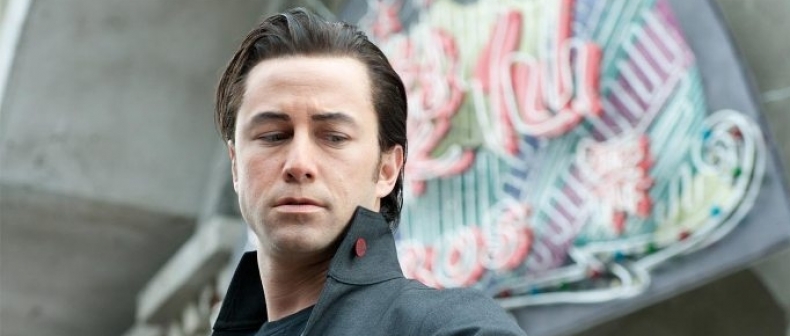
“Looper”
There are essentially two kinds of time travel movies: the simple kind, in which the characters travel through time just once and entirely for the sake of a fish-out-of-water plot (Back to the Future), and the complicated kind, in which the logistics of time travel are played with throughout, often to the extent of hurting your brain (Back to the Future Part II). The new Looper, directed by Rian Johnson (Brick, The Brothers Bloom), belongs to the second category, and while it’s very skillfully made and entirely deserving of its future fandom, I wasn’t partial to it for the same reason I’m not partial to most Category Two time travel movies: they make you spend all your time pondering whether or not they make sense instead of just giving you a good story. More problematically, they present you with moral quandaries that have no analogue in real life, like: should I kill an innocent person today to prevent them from killing someone I love in the future? Call me unreflective, but that’s not the sort of question that keeps me up at night.
I had reason to hope Looper would be more of a Category One. In the teaser trailer, a character played by Jeff Daniels says something along the lines of, “This time travel crap just fries your brain like an egg,” which I took as a sign the movie would downplay the usual tortured logistical concerns and focus on zippy fun. Alas, the movie is mostly tortured logistical concerns, with bits of zippy fun crammed in at the edges.
The year: 2044. The place: Kansas. Our hero, Joe (Joseph Gordon-Levitt, wearing make-up to resemble a young Bruce Willis but looking more like an old Mickey Rourke), explains via hard-boiled voiceover that he’s a looper, a hired assassin paid to do the dirty work of mobsters of the future. In brief: when the mob of 2074 wants a guy “got,” they truss the fellow up and send him back in time, whereupon Joe or another looper immediately shoots him and disposes of the body. This rather complicated approach is said to be necessary because hiding bodies has become all but impossible in the future. (Have corrosive acids been outlawed? Is the bottom of the ocean being monitored?) Just to make sure there’s no loose ends, every looper agrees to “close his loop” when required, which means killing his future self. Once that happens, the looper gets to retire and live the next 30 years in luxury until his preordained death. The plot is set in motion when Joe hesitates to close his own loop, giving his future self — Bruce Willis — an opportunity to knock him unconscious and escape.
From the start, this concept gave me a bit of trouble. Why get loopers to kill their own future selves? Why not send future loopers back to different loopers who wouldn’t have any compunction about killing them? In any case, when Young Joe wakes up he goes in search of Old Joe, and Old Joe goes in search of a kid who’ll grow up to be a mysterious looper-killer known only as the Rainmaker. When Young Joe loses the scent, he ends up on a farm run by a shotgun-toting single-mom named Sara. Oddly, the role of Sara is played by British actress Emily Blunt, who is excellent as always but sounds hilarious, like she picked up her accent watching Li’l Abner reruns. Without giving anything away, the movie’s momentum slows considerably when we meet Sara and her kid; at the same time, the scenario becomes much more complicated. It’s not too hard to guess where the movie’s going, but it’s maddening trying to figure out how it can possibly get there. As it turns out, Johnson didn’t figure it out either, and the ending will either thrill you or frustrate you in its total disregard for the rules of cause and effect.
On the plus side of the ledger, the movie is admirably human-scaled, with each plot twist significant mostly for how it affects the characters on a personal level. And in the handful of scenes between Young Joe and Old Joe, Johnson actually gets you thinking about your relationship to your younger self. Would you even like the young you? Or would the ways you’ve grown and changed (or failed to grow and change) all but guarantee a degree of antagonism? To me, that’s the sort of mind-bender worth puzzling over.
“Won’t Back Down”
Has Maggie Gyllenhaal always been such an egregious over-actor? I didn’t notice it in Secretary, The Dark Knight, or Crazy Heart, but I’m thinking there may have been early hints in Sherrybaby. In any case, her work this year, in Hysteria and the new Won’t Back Down, is cringe-inducing, the sort that makes you forget what you ever saw in a performer. In both movies she plays scrappy go-getters, women who effect social change via sheer force of will, but she can’t stop selling us on her pluck and gumption.
In Won’t Back Down, Gyllenhaal is a blue-collar single mom trying to fix the broken American education system, and she acts like she’ll literally explode if she doesn’t let out all her positive, sexy energy. She pounces on sympathetic teachers, stares down indifferent bureaucrats, grabs fellow parents by the arms and shakes them out of apathy. And all the while, she feels. Oh, how she feels! When her dyslexic daughter loses a charter school lottery, her face goes catatonic for what feels like an eternity, and when she riles up concerned parents at a subsequent rally, she looks like she’s having an orgasm. Gyllenhaal seems to want to be the new Sally Field, but based on the evidence here she’s not even the new Hilary Swank.
The movie itself is an interesting failure, and just smart enough to make you wish it weren’t so stupid. The director and co-writer, Daniel Barnz, clearly did his homework, digging into so-called “parent trigger laws” (which permit parents to take over failing public schools in a handful of states) and going surprisingly far into the thorny subject of teacher’s unions. But he doesn’t have the first clue how to dramatize the material without getting didactic, and the need for uplift means he constantly short-changes the real-life issues. Because every feel-good movie needs bad guys, the teacher’s unions fulfill that role here, with union head Holly Hunter being so nefarious as to try to bribe Gyllenhaal’s character to drop her takeover bid.
It’s probably worth noting that the movie was financed by Walden Media (which also financed the recent education system documentary Waiting for Superman), and that company co-founder Michael Flaherty has a background in education. Also, the owner of the company, Philip Anschutz, is a conservative Christian who’s been accused of inserting his religious agenda into the company’s Chronicles of Narnia films. But in Walden Media’s defence, the only agenda I could discern in Won’t Back Down was the Hollywood agenda of making complex issues reassuringly non-complex.
The best reason to see the movie is Viola Davis as a disillusioned teacher who regains her self-respect by teaming up with Gyllenhaal. As in The Help, Davis is making do with a role far beneath her, but she has more to work with here, and her character — mercifully — isn’t defined by her blackness. In fact, her defining trait has nothing to do with race, but with age. Her teacher character isn’t old, but she’s no longer young, and when the movie begins she’s right at a turning point: teetering between youthful ideals and the sanity-saving urge to give up and start phoning it in. Davis pulls off a number of subtly effective moments, and if nothing else her thoughtful demeanour provides necessary respite from Gyllenhaal’s relentless super-woman schtick. Even in their quietest scenes together — just sitting at a kitchen table drawing up proposals — the two are a study in contrasts. While Davis looks like she’s actually writing and thinking, Gyllenhaal has to “act” like she’s writing and thinking; she can’t even erase a pencil error without rubbing a hole through the paper.
____
Scott MacDonald writes about cinema for Toronto Standard. You can follow him on Twitter at @scottpmac. He just started tweeting, so be gentle with him.
For more, follow us on Twitter @TorontoStandard and subscribe to our newsletter.














